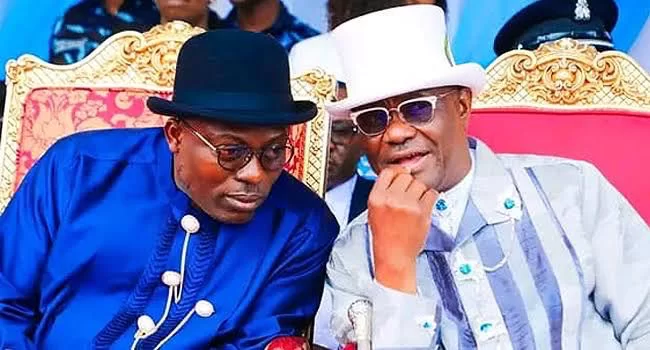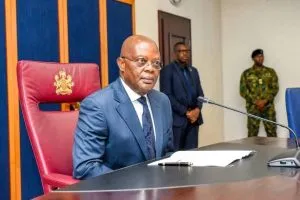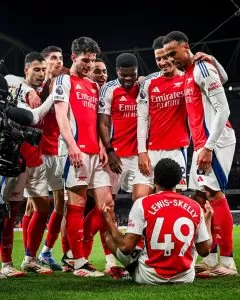Wike’s Claim of Fubara as “Political Son” Holds Amid Strained Ties, But Full Picture Remains Unclear

On May 17, 2025, Nyesom Wike, the Minister of the Federal Capital Territory and former Rivers State governor, made headlines by reaffirming that Rivers State Governor Siminalayi Fubara remains his “political son” despite their widely reported political rift. The statement, delivered in an interview with BBC Pidgin, included Wike’s assertion, “He is my boy, my son, why will I fight with him?” This framing seeks to downplay personal conflict, with Wike attributing tensions to external influences on Fubara rather than a direct feud. While the claim appears consistent with available reports, the complex dynamics of their relationship and the absence of the full interview leave the true nature of their bond murky.
The Context of the Claim
Wike’s statement comes against the backdrop of a protracted political crisis in Rivers State, which began escalating in 2023. The rift between Wike and Fubara, once considered mentor and protégé, became public with attempts to impeach Fubara and clashes over control of the state’s political machinery. Wike, who played a pivotal role in Fubara’s rise to the governorship in 2023, has maintained a narrative of paternal guidance, even as their relationship soured. Reports from outlets like Punch and The Nation confirm Wike’s remarks in the BBC Pidgin interview, where he emphasized that his disagreement lies with individuals allegedly manipulating Fubara, not Fubara himself.
Fubara, for his part, has not publicly denied the “political son” label. Earlier in their relationship, he acknowledged a “father-son” dynamic, as noted in prior reports. However, his silence on Wike’s recent comments leaves room for speculation about his current stance. Posts on X, such as one from TheNationNews on May 17, 2025, reiterate Wike’s claim, framing Fubara as a “political protégé” despite the ongoing feud. This lack of contradiction from Fubara lends credence to Wike’s narrative, but it also underscores the need for direct evidence, such as a response from Fubara or the full interview transcript.
A Strained Father-Son Dynamic
The political crisis in Rivers State has roots in power struggles that emerged shortly after Fubara assumed office. In late 2023, impeachment attempts against Fubara, allegedly backed by Wike loyalists, signaled a breakdown in their alliance. Wike’s influence over Rivers politics, even after becoming FCT Minister, has been a point of contention, with Fubara seeking to assert his independence. A March 2025 post on X from instablog9ja highlighted Wike’s frustration with Fubara’s actions, such as interfering in Wike’s family matters, indicating deep personal and political grievances.
Despite these tensions, Wike’s recent comments suggest an attempt to reframe the narrative. In the BBC Pidgin interview, he claimed the conflict stems from figures like Abiye Sekibo, Austin Opara, and Celestine Omehia, whom he accuses of instigating Fubara against him. This aligns with Wike’s broader strategy of portraying himself as a benevolent mentor betrayed by external forces rather than a rival to Fubara. A Sahara Reporters article from May 17, 2025, further notes Wike’s use of the term “his boy” for Fubara, reinforcing the paternalistic tone.
Evidence and Gaps
The consistency of Wike’s “political son” claim across multiple sources, including Daily Post, Leadership, and Legit.ng, supports its authenticity. However, the lack of access to the full BBC Pidgin interview limits a deeper understanding of the context. For instance, Wike’s tone—whether conciliatory, patronizing, or strategic—remains unclear without the complete footage or transcript. Additionally, Fubara’s perspective is notably absent. While he has not refuted Wike’s characterization, his earlier actions, such as resisting Wike’s influence, suggest a more complicated reality.
Posts on X provide some insight into public sentiment. A May 12, 2025, post from officialovatv referenced Wike’s claim that Fubara sought reconciliation by visiting his home with two APC governors, indicating moments of attempted peace. Yet, the absence of a direct denial or endorsement from Fubara keeps the narrative one-sided. To fully verify Wike’s claim and its implications, primary evidence, such as the unedited interview or a public statement from Fubara, would be critical.
The Broader Implications
Wike’s insistence on the “political son” label serves multiple purposes. It reinforces his image as a dominant political figure in Rivers State, positioning Fubara as a subordinate despite their rift. It also deflects blame for the crisis onto third parties, potentially softening public perception of Wike’s role in the conflict. However, the ongoing feud, marked by legal battles and political maneuvering, undermines the notion of a harmonious father-son bond. A Premium Times post from May 1, 2025, described Fubara’s reported act of prostrating before Wike as a sign of deference, yet it also hinted at Fubara’s strategic moves to navigate the crisis.
For observers, the situation raises questions about power dynamics, loyalty, and the future of Rivers State politics. Wike’s comments may be an attempt to reclaim narrative control, but without Fubara’s explicit alignment, the “political son” label risks appearing more symbolic than substantive. The crisis also reflects broader themes in Nigerian politics, where godfatherism often shapes governance, sometimes at the expense of autonomy and stability.
Conclusion
Nyesom Wike’s claim that Siminalayi Fubara remains his “political son,” as stated in the May 17, 2025, BBC Pidgin interview, holds based on available reports and Fubara’s lack of public denial. However, the strained nature of their relationship, rooted in political clashes since 2023, complicates this narrative. Wike’s attribution of the rift to external influences rather than Fubara himself appears strategic, but the absence of the full interview and Fubara’s response leaves gaps in understanding the true dynamic. For a clearer picture, accessing the complete BBC Pidgin interview or eliciting a direct statement from Fubara would be essential. Until then, while Wike’s claim stands, the reality of their “father-son” bond remains as turbulent as Rivers State’s political landscape.






